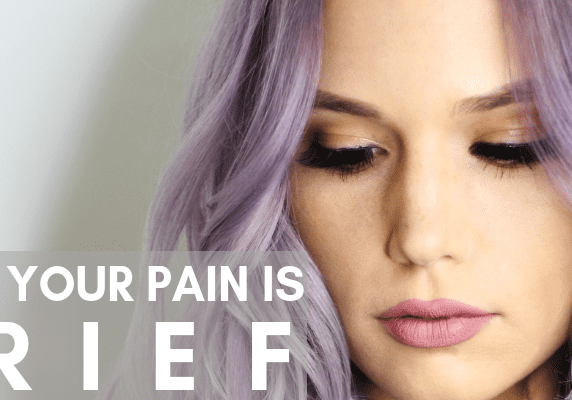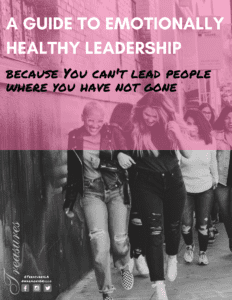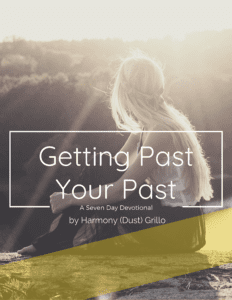Posted in FEATURED, GETTING PAST YOUR PAST
WHEN YOUR PAIN IS GRIEF

Just after I finished a year-long step study, my friend invited me to a grief recovery group she was facilitating. Having just gone through the pain-staking process of taking a “searching and fearless moral inventory” of myself, I was ready for a break from all things recovery. It was an easy “no”.
“Okay. Well, would you just pray about it?” she nudged.
I agreed to pray, but felt very confident in my original decision. My prayer went something like this, “God, I have no desire to take a class on grief recovery. I told Jocelyn I would pray, this is me praying. Over and out.”
“Your pain in grief.”
Before I fell asleep at night, when I woke up in the morning, that’s all I heard.
“Your pain is grief.”
I knew I needed to take that dang class. As begrudgingly as I did, it helped me find emotional completion in the aftermath of my divorce as well as to grief surrounding the part of my childhood that was lost to abuse, abandonment and neglect. What I didn’t know at the time was that I would desperately need to use what I learned again and again for years to come.
Soon after my husband and I started dating, my best friend and sister-in-love was tragically murdered by her husband. A few months after our wedding, my husband’s brother committed suicide. Less than a year later, a dear friend of mine took her life too. All the while, we lost baby after baby on our journey to having a child. Five in total. Then, as some of you may know, on June 21st, my mother died of young-onset dementia at the age of 63. Sixteen days later, my husband’s father who raised him died after a long battle with cancer.
We are no strangers to grief.
In fact, it feels like we have been grieving one thing or another our entire relationship. And while it does not take away the sting of loss, knowing how to process grief and find emotional completion has helped our hearts continue to heal. Our marriage is stronger for it.
If your pain is grief, I want to share some things that have helped me as I have navigated grief in my life.*
PEOPLE ARE GOING TO SAY DUMB STUFF
I am sorry, but it is true. Your heart will be hurting and well-meaning people who don’t know how to hold space for your grief will say something like the following to try to make you feel better.
“They are in a better place.”
“You can still have another child.”
“There are more fish in the sea.”
“I know exactly what you are going through.”
“All things happen for a reason.”
Whether they are avoiding their own grief, afraid of our feelings or just plain uncomfortable and want to “fix it”, this is bound to happen. It is helpful for me to remember that when people say stuff like this, usually, it’s because they themselves haven’t learned to deal with grief in healthy, honest ways. This helps me have compassion and fight the urge to kick them in the shin.
IT’S COMPLICATED
Usually, grief is complicated. People are complicated. We might feel an urge to either idealize or villainize a person after a death or divorce. In one instance, focusing on all of the positive experiences and attributes, in the other, focusing on all of the negative.
After my mother died, my brain was in a ping pong match, rapidly vacillating between beautiful memories of her taking me on night swims at the beach and catching caterpillars together, to those of her stealing money out of my piggy bank for drugs and flying into a rage when the groceries fell out of the back of the van and hitting me for no reason.
It was as if my mind was trying to make sense of her, to categorize her into a final resting place, once and for all. Was she good or bad? She was both. And I have to find a way to hold the tension between the two realities of her.
Facing the whole truth of our grief, in all of its complicatedness, is part of the path to emotional completion.
TIME DOES NOT HEAL ALL WOUNDS
In fact, quite the contrary. Whether we try to anesthetize our pain with addictions or unhealthy coping mechanisms or our grief prevents us from opening our hearts to new people and relationships, unresolved grief can cause issues for years to come.
After our first miscarriage, my husband brought home Velveeta Shells and Cheese and Cherry Garcia ice cream. We lied in bed, binged on Netflix and filled our tummies with the salty, sugary goodness of macaroni and cheese and ice cream. Every miscarriage and every loss since, we have done the same. It has become sort of a grief ritual.
In grief recovery, this is known as STERB-ing. A STERB is a Short-Term, Energy-Relieving Behavior. Essentially, it is a behavior that helps to temporarily relieve some of the pain of grief. Temporarily being the operative word.
While we have come to find some measure of comfort in our routine, we know that our grief will not get resolved with junk food and television. If we engaged in STERB-ing as a way of life, we would be in trouble. We would be an emotionally disconnected couple with high blood pressure and high cholesterol.
Instead, we worked through the sorrow— the loss of the children whose future we had already begun to dream of, the shattered hope, and the fears of it happening again. In time, we named each baby, said what we needed to say and felt what we needed to feel.
The truth is, time does not heal all wounds. We have to face our pain to overcome it.
THE STAGES OF GRIEF ARE A MYTH
The concept of the “stages of grief” was intended to identify the emotional process a person who had been diagnosed with a terminal illness might go through. It was not meant to be applied to the experience of someone experiencing a loss. Mistakenly, many people assume that grief follows this pre-set category of stages and that the only way to heal is to experience each one of them.
In reality, the experience of grief is unique to every person and relationship and may or may not include things like anger and bargaining.
Having each lost a parent within a few weeks of each other, my husband and I are both experiencing a similar category of grief. However, our emotional reaction to, experience with and feelings about our losses are different. Just because I also lost a parent, I don’t assume that I know what my husband is going through and vice versa. Instead, we ask questions and share our thoughts and feelings which can change from day to day and moment to moment.
One moment, I might feel sorrowful as I think of the grandmother my mom will never have the chance to be to my children, and the next, I might feel gratitude for the healing and closure we had in our relationship. Right after she died, one day I felt like reading her poetry and going through old photos, the next, I felt like going to the office and getting some work done.
When it comes to grief, it is important to give ourselves and each other permission to grieve in our own unique ways.
SAY WHAT YOU NEED TO SAY
One of the things that I have learned is that so much grief comes from undelivered communication. The apologies, forgiveness and other emotional statements that we didn’t get the chance to share.
Knowing this truth, and also knowing that my mom wouldn’t have her faculties for much longer, my husband kept asking me if there was anything I needed to say to her before it was too late. I had already forgiven her for the places of pain in our relationship, I realized that I needed to thank her for all that she did right as a mother. While she still had some lucidity, we took her on a hike through the majestic, red rock formations at the Garden of the Gods in Colorado. Sitting under the shade of a tree, with joyful, squealing children, playing in rock caves nearby, I was able honor her for teaching me to fight for justice, love nature, think creatively, and live generously. It was one of the most beautiful moments I have ever experienced with another human.
The unfortunate reality is that not all loss affords us this opportunity. As was in the case of my sister-in-love, sometimes people are taken from us tragically and unexpectedly. On top of all that is left unsaid and all that will never be, we are left with the added pain of the circumstances of their death.
Even in these heartbreaking situations, we can still find emotional completion by doing the work of grief recovery and using a completion letter to say what we need to say. I still miss her. With her, the grief has been long and hard. However, I have found some healing and comfort in processing our relationship—the things I needed to apologize for, the things I needed to forgive her for, the things I wanted to thank her for, as well as all of the broken hopes, dreams and expectations. Saying all that was left unsaid hasn’t made me miss her any less, but it has helped my heart heal.
These are just a few of the things that have helped me work through grief. I would love to hear what has been helpful to you….
Love, Harmony
*Most of what I have learned about grief has come from The Grief Recovery Handbook by John W. James and Russel Friedman and the class I took with my dear friend and certified grief recovery counselor, Jocelyn Jackson Williams.
Feel free to share this blog with someone you know who is grieving.
FREE DOWNLOADS

At thirteen, after being abandoned by my mother one summer and left to take care of my younger brother, I became susceptible to a relationship that turned out to be toxic, abusive, and ultimately exploitative. I eventually found myself working in a strip club at the age of nineteen, and my boyfriend became my pimp, controlling my every move and taking all of my money.
Scars and Stilettos is my stark, honest, and ultimately hopeful story of how God found me in that dark, noisy place, led me back out, and prompted me to help others who are trapped as I once was. I hope to expose the realities of the commercial sex industry and inspire hope that freedom and healing are possible for those involved.
Leave a Comment
more from the blog
Kanye West & Bianca Censori’s Red Carpet Moment: Empowerment or Expl0itation?
Kanye West showed up to the Grammys’ red carpet with his wife Bianca Censori wearing what…
Read MoreReclaiming Your Power From a Narcissist: How to Break the Cycle of Narcissistic Abuse
If you have found yourself caught in a cycle of narcissistic abuse, you probably feel worn…
Read MoreUnmasking Narcissism: The Relationship Pattern That Will Leave You Heartbroken
If you’ve ever faced the crushing blow of being discarded by a narcissist and found yourself…
Read More





